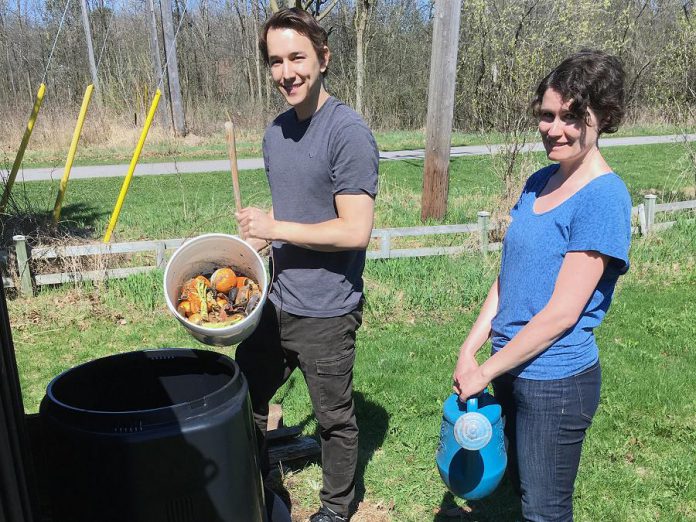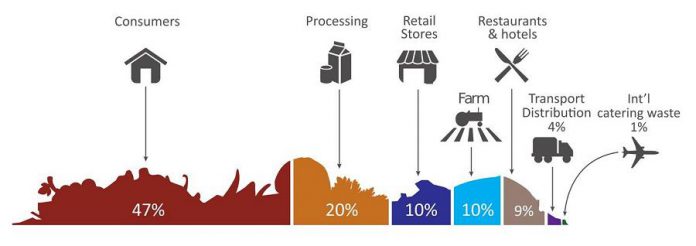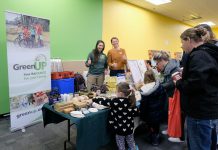
The warm weather has arrived and it’s here to stay. With it brings the annual spring cleaning fever as we clean out our closets, tuck away our winter coats, and tidy up around our yards. It’s also a great time to check on your composter! What better time than this week, as we celebrate International Compost Awareness Week from May 6th to 12th.
During the long winter months, many of us with backyard composters are guilty of the “dump and dash.” The cold weather prevents us from caring for our composter, but we still need a place for our food scraps to go. The warm weather we experienced last week has jump started the good bacteria to get back to work, and as you start planning for veggie and flower gardens, here are some tips to get your composter ready:
-
Lift the Lid
Take the lid off your composter during those warm, sunny days. It will accelerate the decomposition process, and the good compost critters will thank you.
If you are worried about pests having an open invitation to your compost, cover your greens (veggie and fruit scraps) with browns (leaves, shredded newspaper).
This will mask the smell and doing so is also beneficial to accellerating the breakdown process.
-
Stir for Success
Most of us haven’t turned our compost since last fall when the weather was still nice and the ground wasn’t frozen.
Adding oxygen is important for the breakdown process and will help create soil more quickly.
Mix things up with a shovel, pitchfork, or compost cane.
-
Manage Moisture
A healthy composter will look and feel like a sponge.
If it looks too wet, add browns to absorb the moisture. Pests are more likely to occur when your composter is overly wet, usually from a food scrap overload.
If it looks dry, add water like you would to your garden. Worms need moisture to survive, and will get to work with the right balance.
When we become more aware of our waste habits, it drives personal action. Many of us recognize the importance of reducing our ecological footprint, but even the best intentions do not always translate into action. Backyard composting is a simple and accessible way to close the “intention-action” gap. Changing our behaviour does have an impact.
The Government of Ontario recently released an action plan for the Ontario Food and Organic Waste Framework. As we move towards a “circular economy,” discarded food and organics can be seen as a resource, rather than waste. The plan focuses on both waste reduction and resource recovery activities.
On a large scale, food and organic waste collection and recovery programs have many benefits for us all. They create jobs and generate products that are estimated to contribute millions of dollars for the Ontario economy. Additionally, they will help us reach our climate change goals. Doubling our current recovery rate would reduce an additional 1.1 megatonnes in greenhouse gas emissions — the equivalent to removing approximately 260,000 cars from Ontario roads each year!

So what are the products that are generated? Organic materials can be used to create biogas. Through anaerobic digestion, materials are broken down in an oxygen-deprived environment where the by-product is a renewable energy form consisting primarily of methane. This renewable energy source can be used to generate cleaner electricity and reduce our reliance on fossil-based fuels. This means that on a large scale, food waste is a potential source of energy!
Compost also improves the long term health of our soil. Each year, climatic events such as flooding, drought, and extreme weather degrade our soil. Soil amendments, such as compost, increase organic matter and soil longevity. The benefits of composting, whether on a small or large scale, are imperative towards a sustainable future.
However, our efforts should not be limited to collecting and recovering waste at the end-of-life stage. We must also consider how to prevent food waste from occuring in the first place.
A new Peterborough community roundtable has been formed to address issues connected with reducing food waste. GreenUP, along with local stakeholders, Peterborough Public Health, Nourish, Curve Lake First Nation, the City and County Waste Management Divisions, and Sustainable Peterborough meet monthly to discuss through various lenses, how to decrease wasted food in our community. In the upcoming months the group will be releasing information about a community awareness event in September.
If you want to begin reducing your own food waste at home and in the workplace, here are some tips to get you started:
Plan and Prep
You can prevent throwing away wasted food with a few small lifestyle changes.
Make a menu plan for yourself and your family. Not only will you make mealtime easier, but you will save money by only buying what you need.
You will end up with extra free time during those busy weekdays for spending time with your family or engaging in your favourite hobby.
Bought and Forgot
Approximately 40 per cent of the food produced in Canada is thrown out.
Half of this waste is thrown out from our own homes. Uneaten leftovers, untouched fruits and vegetables are food that is bought, but otherwise forgotten.
Plan your leftovers for the week and stick to your meal plan while grocery shopping.
Finish what you Start
This year, the City of Peterborough announced a source-separated organics pickup program that will be implemented in the fall of 2019. Although green bins are coming, it is important that each of us consume our food rather than tossing it.
Plan appropriate meal sizes so that nothing gets thrown out, or save it for later in the form of leftovers.
The combination of backyard composting and food waste prevention is something all of us can do. Renew your commitment to the local environment.
If you are new to composting and resident of Peterborough, sign up for the Kitchen to Compost program. For $20, the City of Peterborough will deliver a composter while assisting you with installation and instruction on care for your composter. Contact waste@greenup.on.ca to get registered!
Self-serve compost made from local organic waste can be purchased at GreenUP Ecology Park, 1899 Ashburnham Drive in Peterborough. Check www.greenup.on.ca/ecology-park/garden-market for hours.
For more information on the Ontario Food and Organic Waste Framework Action Plan visit www.ontario.ca/page/food-and-organic-waste-framework


























